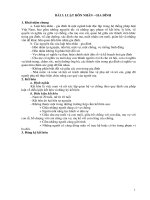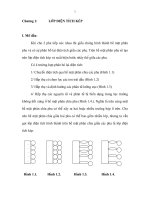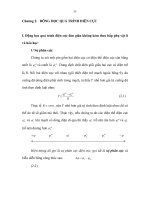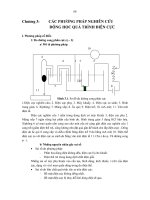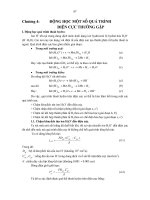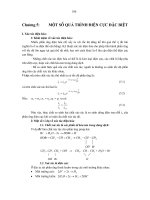PRESENT CONTINUOUS versus SIMPLE PRESENT LY THUYET
Bạn đang xem bản rút gọn của tài liệu. Xem và tải ngay bản đầy đủ của tài liệu tại đây (78.29 KB, 2 trang )
UNIT 4: PRESENT CONTINUOUS vs SIMPLE PRESENT
1. Talk about
present
THE PRESENT SIMPLE
Permanent actions
- Usually we have dinner at
7.
- I often drive to work.
2. Talk about
the future.
Plans and arrangements.
- What are you doing tonight?
- I'm seeing a very important
customer in my office at 4
o'clock.
- We are going to the see for
our holiday.
- Where are you staying in
Vienna?
- I'm not going anywhere. It
is final.
3. Talk about
habits
Normal habits
- I often watch TV.
- He sometimes drink beer.
4. State verbs
THE PRESENT CONTINUOUS
Temporary actions
- Usually we have dinner at 7, but today we
are having it at 9.
- I often drive to work but I'm taking the train
this morning because my car is in for repair.
- I usually don't drink coffee but I'm having
one this morning because there is nothing
else.
Timetable, schedules, itineraries etc.
- My plane takes off at 9.00.
- The President arrives in Norway on 17
September.
- What time does your train leave?
Annoying, unusual habits
- My flatmate is always leaving the kitchen in
a mess!
- He is always watching TV.
Some verbs are not normally used in the
Continuous Tense. They are called "state"
verbs. with state (or stative) verbs such as
like, dislike, love, think, seem, look,know, f
eel, understand, want, need, hate,remembe
r, forget, prefer, believe, mean,taste, hear, s
ee, have (when the meaning is
"possess"), own, belong, etc. These verbs are
not normally used in the Continuous Tense.
Some verbs used in the simple form can also be used in the continuous form. That's typically
when they have an active meaning or emphasize change. Very often these sentences have a
completely different meaning:
Verb
Form
Verb
Example
Meaning
Simple
to think
I think you should see a doctor
opinion
Continuous
to be
thinking
I'm thinking of changing my flat
trying to reach a decision
Simple
to love
I love going to the cinema
feeling
Continuous to be loving
You look great in this hat. I'm loving
it, man!
emphasis or gradual
process
Simple
to smell
I smell something burning
sense
Continuous
to be
smelling
My baby was smelling a flower
activity
Simple
to have
He's really rich — he has 3 cars
possession
When you called me, I was having a
bath
activity
I can see you have a big garden
sense
I'm seeing him later
appointment
I could taste a lot of sugar in the wine
sense
He was tasting the cake and said it was
OK
activity
Continuous to be having
Simple
to see
Continuous to be seeing
Simple
to taste
Continuous to be tasting
Keep in mind there is a group of verbs that can be used in both the continuous and simple forms
with no difference. These are, for example, the verbs "to hurt" and "to feel":
1. How is Mary feeling after the accident?
How does she feel after the accident?
2. You look well today.
You are looking well today.
